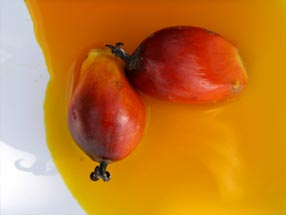

Facts about palm oil
Fats – a source of energy and vitamins
We all enjoy eating foods containing fats because fat provides texture and enhances the flavour of foods. Consumed with moderation, fat is an essential component of the human diet. Firstly, it provides energy. 1 gram of fat is equivalent to 9 calories( or 37 kj). Second, it provides fat-soluble vitamins in the form of vitamins A,D,E and K. And lastly, it is a source of essential fatty acids, which are substances that the body cannot produce itself. Essential fatty acids are vital to good health as they help in the formation and maintaining of cell membranes.
Fatty acids
An average grown up needs 2000kcal(women)/ 25000 kcal(men) a day from the diet. Tue Guideline Daily Amount rec ommends that 30% of the nutrient intake a day come from fats. Fat in food is tryglyceride and is made up of three types of fatty acids, namely saturated fat, monounsaturated fat and polyunsaturated fat. For proper functioning of membranes, a good combination of these three classes of fatty acids is essential. The right energy balance is equally critical to maintaining healthy body weight and ensuring optimal nutrient intakes.
Palm oil as dietary fat
Palm oil, like all other oils and fats, provides 9kcal per one gram of oil. Palm oil is a balanced oil containing equal amounts of saturated and unsaturated fatty acids. Its component fatty acids consist of approximately:
- 50% saturated( mainly palmitic acid)
- 40% monounsaturated(mainly oleic acid)
- 10% polyunsaturated
Nutritional Benefits of Palm Oil
Palm oil has many nutritional benefits, which have been confirmed in both metabolic and epidemiological studies. Palm oil :
- is easily digested , absorbed and metabolized
- play a useful role in meeting the energy and EFA needs in many regions of the world
- is naturally saturated. This means that hydrogenation is not required to make palm oil solid
- is rich in protective aantioxidants, beta carotenes and vitamin E
- is composed of a balanced mixture of fatty acids
- contains a moderate amount of linoleic acid;and
- has not been shown to elevate blood cholesterol levels in comparison with olive, canola or groundnut oil
Source: Chandrasekharan, N and YUSOF Baisron. Changing Perceptions on the Role of Saturated Fats in Human Nutrition, p 18

Source: Dr Colettle Kelly. Dietary Fat and Cardiovascular Diesease, Nov 2001 Chandrasekharam, N and Yusof Basiran. Changing Perceptions on the Role of Saturated Fats in Human Nutrition Dr Augustine S.H: Goh. Palm Oil - The Preferred Partner in the Food Manufacturing Industry. Palm Oil As Healthy as Olive Oil, March 2002 - www.mpoc.org.my
- Menu Navigation
- Nutrition & Health
- Palm Oil
- FAQ
Unitata Berhad (10769-H) - Jendarata Estate - 36009 Teluk Intan Perak Darul Ridzuan - Malaysia.
All rights reserved. Unitata is a registered trademark and part of UP - United Plantations Berhad. Terms condition, features, availability and general are subject to change without notice.